Sheep farming holds great potential in the agricultural landscape of Karnataka, offering lucrative opportunities for farmers. In this blog, we will delve into the various aspects of sheep farming, focusing on loans and subsidies available in the region. Discover the profitability of this venture and explore the thriving Karnataka sheep market. Learn how to kickstart your sheep farming business with a comprehensive business plan tailored to the unique demands of the Karnataka region.
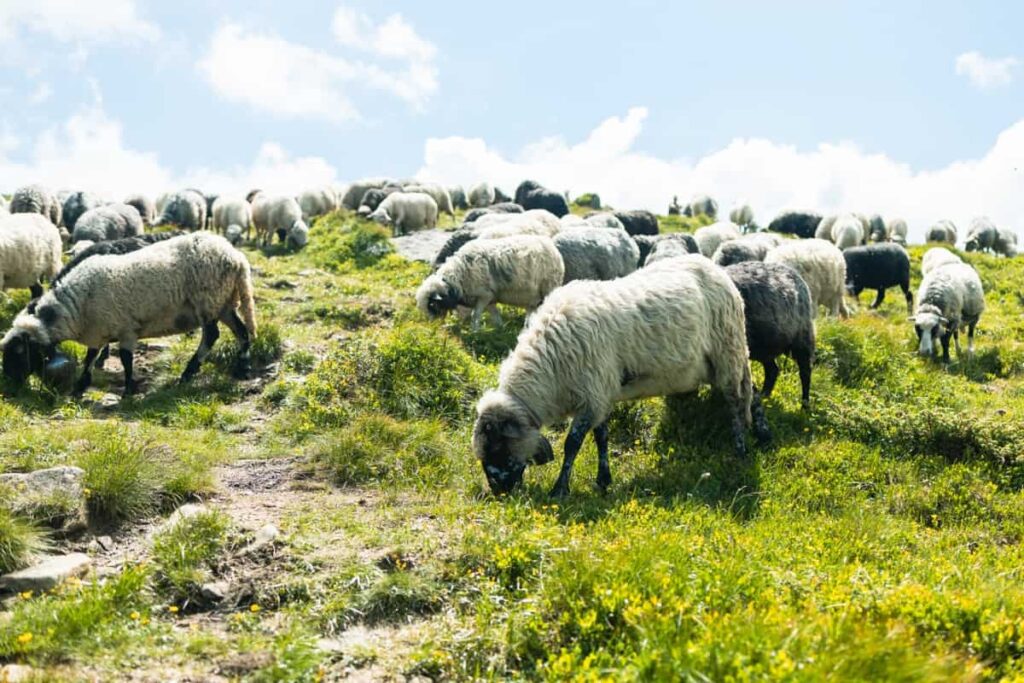
Uncover the specific sheep breeds native to Karnataka and understand how to avail of government loans and subsidies. Gain valuable insights into training programs and access project reports for successful sheep farming. Moreover, we will guide you through obtaining loans for your sheep farming endeavors and highlight the subsidies offered in Karnataka.
Karnataka Sheep Farming
Best Sheep Breeds for Farming in Karnataka
Deccani Sheep, also known as the Bellary breed, are medium-sized sheep well-suited for dry and arid regions in Karnataka. They thrive in harsh climates and display resistance to diseases. With an average weight of 30-40 kg, Deccani sheep produce high-quality meat known for its exceptional taste and texture. Their coarse wool provides good insulation. These sheep have a 110-120% reproductive efficiency, making them highly valuable for breeding.
They are also renowned for their strong maternal instincts, ensuring the survival of their lambs in challenging environments. Mandya Sheep, native to the Mandya district, are recognized for their excellent meat quality. They have a compact body structure with a distinct black head and ears. With an average weight of 35-40 kg, Mandya sheep are adaptable and resist common diseases. Their reproductive efficiency ranges from 120-130%, making them ideal for breeding programs. Additionally, their wool is of good quality and can be utilized diversely.
Hassan Sheep, named after the Hassan district, excel in meat production. With an average weight of 40-45 kg, they have a sturdy body structure and adapt well to local climatic conditions. Hassan sheep exhibit disease resistance and possess an exceptional reproductive efficiency of 130-140%. Their meat is known for its superior quality and tenderness. Furthermore, their wool has excellent spinning properties.
In case you missed it: Date Palm Cultivation in Karnataka: A Step-By-Step Guide to Planting to Harvesting for Beginners
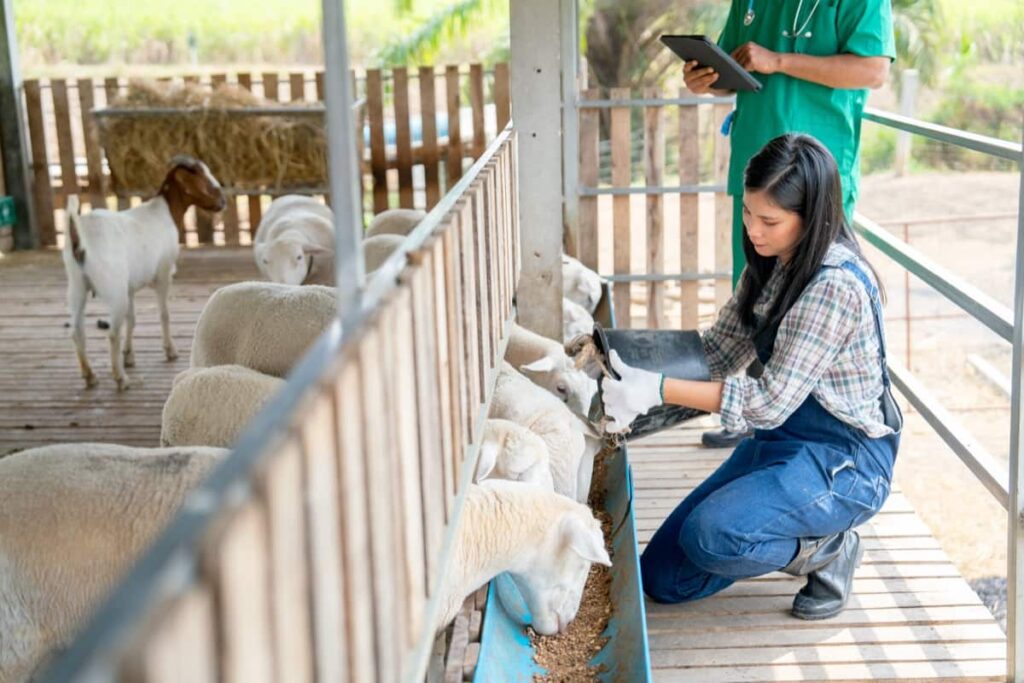
Jalauni Sheep, originating from Jalaun district in Uttar Pradesh, has gained popularity in Karnataka due to their adaptability. They have an average weight of 35-40 kg and boast excellent meat quality characterized by tenderness and flavor. Jalauni sheep exhibit strong maternal instincts and have 120-130% reproductive efficiency. Their wool is of good quality and serves multiple purposes.
Nellore Sheep, originally from Andhra Pradesh, is widely reared in Karnataka for their adaptability and high meat production potential. With an average weight of 45-55 kg, they possess excellent meat quality with a favorable meat-to-bone ratio. Nellore sheep exhibit disease resistance and adaptability to local climates. They have a reproductive efficiency of 130-140%. Although their wool is coarse and less commercially significant, their meat production capabilities make them a valuable choice for farmers.
Sheep Farming Techniques in Karnataka
Grazing Management: Implement rotational grazing to optimize pasture utilization and prevent overgrazing. Divide pastures into smaller paddocks and rotate sheep periodically to maintain pasture health. Employ a forage mix suitable for the specific region and sheep breed.
Fodder Production: Cultivate nutritious crops like oats, maize, and sorghum for supplemental feed. Utilize silage-making techniques to preserve excess fodder for the dry season. Optimize nutrient content by ensuring proper fertilization and irrigation.
Breeding and Reproduction: Select genetically superior breeding stock for improved productivity. Implement controlled mating and estrus synchronization techniques for better reproductive efficiency. Monitor ewes closely during lambing and provide necessary assistance when required.
Health and Disease Management: Vaccinate sheep regularly against common diseases in Karnataka. Conduct periodic deworming and implement a parasite control program. Maintain proper hygiene in housing and handling facilities to minimize disease transmission.
Shelter and Infrastructure: Construct well-ventilated and clean shelters to protect sheep from extreme weather conditions. Ensure adequate space per sheep to minimize stress and maintain flock health. Install proper fencing.
Nutrition and Feeding: Provide a balanced diet comprising grains, forage, and mineral supplements. Adjust feeding regimes based on the nutritional requirements of different age groups. Monitor body condition scores regularly and make necessary adjustments to the feeding program.
In case you missed it: Karnataka Organic Farming: For Vegetables, Fruits, Millets Crops, Livestock, Aquaculture, and Certification
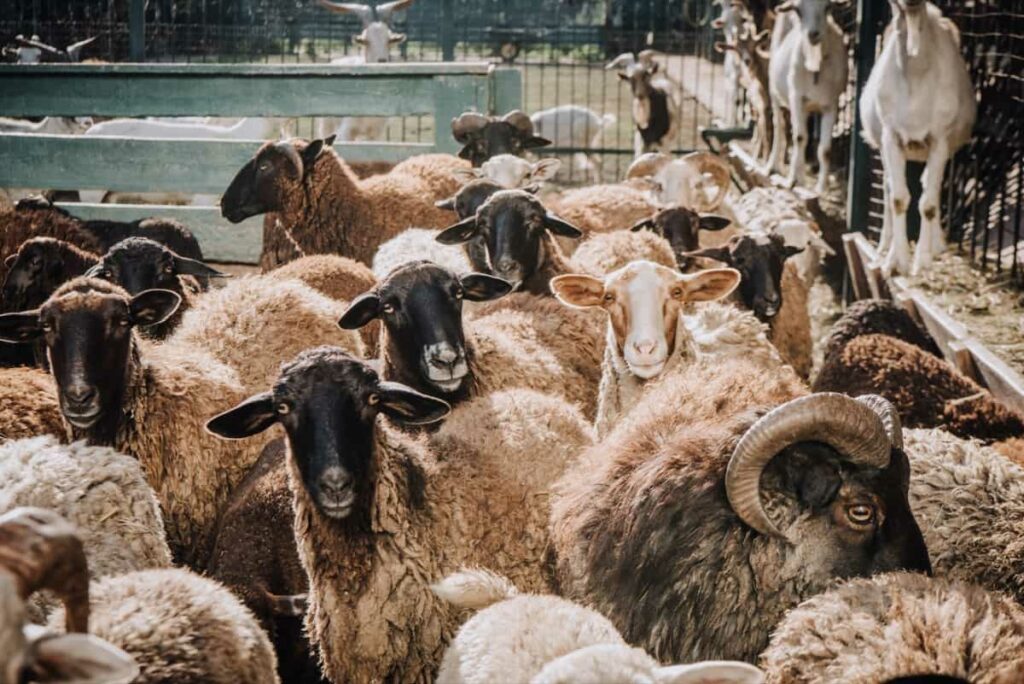
Sheep Farming Equipment Suppliers in Karnataka
The corporation promotes the adoption of mechanical wool shearing among sheep farmers in Karnataka. Mechanical shearing allows for the shearing of a larger number of sheep in a shorter duration, thereby increasing efficiency. It also enhances the wool’s staple length and improves its market value. The corporation provides mechanical wool shearing services to farmers for Rs. 5 per sheep, which can be availed through the corporation’s head office, local district offices, or veterinary institutions.
Disease Management in Sheep Farming in Karnataka
It is recommended to deworm sheep at least 3-4 times a year. The Karnataka Sheep and Wool Development Corporation supplies anthelminthics free of cost through veterinary institutions to support sheep farmers in maintaining the health of their flock. This practice increases production and reduces sheep mortality, benefiting the farmers.
To enhance the quality and quantity of sheep products, the Karnataka Sheep and Wool Development Corporation supplies improved varieties of rams and bucks to farmers at subsidized rates. These animals are produced and supplied through sheep breeding centers. The objective is to improve the local sheep breeds and increase production, thus generating higher revenue for sheep farmers.
Loan and Subsidy Options for New Sheep Farmers in Karnataka
The Karnataka Sheep and Wool Development Corporation offers various loan and subsidy options for new sheep farmers in Karnataka. These include a sheep farming loan at subsidized interest rates, which depend on farm size and farmer requirements. The government also provides subsidies for sheep farm infrastructure, such as sheds and fencing, which help reduce initial investment. Subsidy amounts vary based on farm size and eligible expenses.
Sheep purchase subsidies help reduce the cost of acquiring genetically superior animals for better productivity. Fodder development subsidies encourage farmers to grow nutritious fodder crops, covering expenses related to seeds, fertilizers, irrigation, and other inputs. The corporation also provides Training and extension services, enhancing new farmers’ skills and capabilities to run successful sheep farming operations.
The Karnataka Sheep and Wool Development Corporation offers subsidies to women self-help groups of scheduled caste and SC women/men members of registered sheep and wool producers cooperative societies. The Special Component Plan provides subsidies for sheep farming at Rs. 23,600, with a loan component of Rs. 13,600 and a subsidy component of Rs. 10,000. For goat breeding, the cost is Rs. 10,000.
In case you missed it: Dairy Sheep Farming: Raising from Scratch for Breeding to Marketing
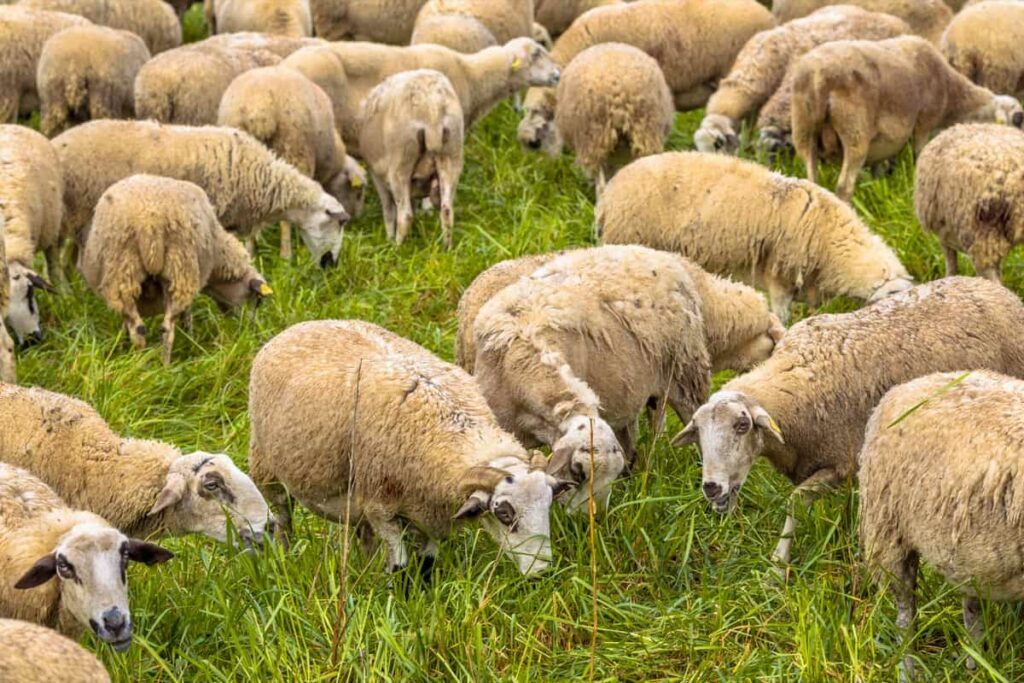
The loan component is provided by local rural/cooperative/commercial banks at scheduled interest rates, while the Karnataka Sheep and Wool Development Corporation provides the subsidy component. The Tribal Sub Plan provides subsidies to women self-help groups and SC women/men members of registered sheep and wool producers cooperative societies. A sheep unit costs Rs. 23,600, with a loan component of Rs. 13,600 and a subsidy component of Rs. 10,000.
The scheme also provides a 50% subsidy for improved variety rams to members of sheep and wool producers’ cooperative societies. Beneficiaries must deposit Rs. 1,750 for each ram supplied under the scheme. Interested individuals should consult with the Karnataka Sheep and Wool Development Corporation or relevant authorities for updated information on subsidy schemes and their application process.
Subsidy Eligibility Criteria for Sheep Farming in Karnataka
- Farmer Eligibility: Farmers engaged in sheep farming activities in Karnataka are eligible for subsidies.
- Age Requirement: The farmer should be at least 18 years old to qualify for subsidies.
- Land Ownership: Farmers must possess agricultural land suitable for sheep farming or have a valid lease agreement for a minimum period specified by the government.
- Flock Size: There is a minimum and maximum limit on the number of sheep required to be eligible for subsidies, which may vary based on government regulations.
- Documentation: Farmers must provide necessary documents such as an Aadhaar card, land ownership proof, bank account details, and any other documents specified by the government.
- Bank Account: Farmers should have a valid bank account for subsidy disbursement.
Low-interest Loans for Sheep Farming in Karnataka
- Karnataka Sheep and Wool Development Corporation provides low-interest loans for sheep farming in Karnataka.
- These loans are designed to support farmers in establishing and expanding their sheep farming enterprises.
- The interest rates on these loans are kept low to ensure affordability for farmers.
- Loan amounts vary based on the specific requirements and scale of the farming operation.
- The repayment terms are flexible and tailored to the financial capabilities of the farmers.
- Farmers can apply for these loans through the Karnataka Sheep and Wool Development Corporation.
- The loans can cover expenses related to sheep acquisition, infrastructure development, fodder production, and other farming needs.
- These low-interest loans contribute to the growth and development of the sheep farming sector in Karnataka.
Profitable Sheep Farming Practices in Karnataka
- Breed Selection: Choose sheep breeds that are suitable for the local climate and in demand in the market. Opt for breeds known for high meat or wool production potential.
- Proper Nutrition: Provide a balanced diet of quality forage, grains, and mineral supplements. Adjust feeding regimes based on the nutritional needs of different age groups.
- Health Management: Implement regular deworming and vaccination programs to prevent diseases. Maintain clean and hygienic housing conditions to minimize health risks.
- Breeding and Reproduction: Select genetically superior breeding stock to improve productivity. Implement controlled mating and estrus synchronization techniques for optimized breeding outcomes.
- Flock Management: Practice effective grazing management to maximize pasture utilization. Maintain an appropriate flock size and monitor individual animal health and performance.
- Marketing Strategies: Identify market demand and trends to develop effective marketing strategies. Explore direct selling options, local markets, and value-added products.
- Record Keeping and Financial Management: Maintain accurate flock performance, expenses, and income records. Analyze profitability, identify areas for improvement, and make informed financial decisions.
In case you missed it: The Ultimate Guide to Sheep Vaccination Schedule: Deworming Chart/Calendar
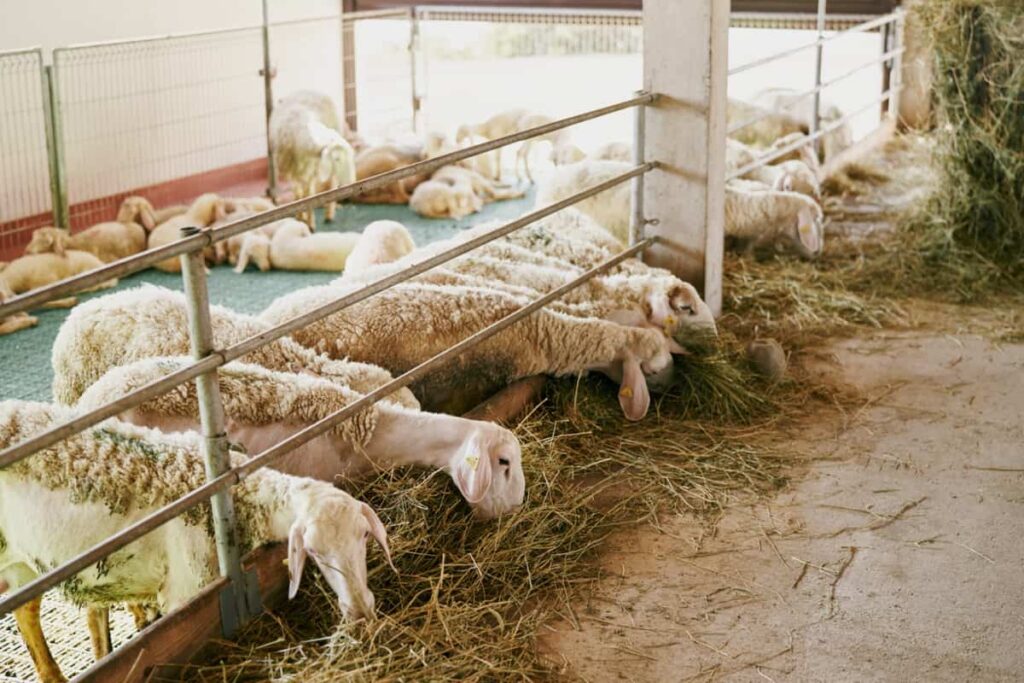
Sheep Feed Suppliers in Karnataka
Sheep feed suppliers in Karnataka include Agro-Feed Suppliers, Livestock Feed Mart, Green Agri Solutions, and Green Agri Solutions. Agro-Feed Suppliers offer different quality feed options specifically formulated for sheep, providing essential nutrients for optimal growth and health.
They ensure consistent quality and freshness, have a strong reputation for reliability and customer satisfaction, and prioritize customer service. Livestock Feed Mart offers a diverse selection of feed products tailored to meet the nutritional needs of sheep, promoting healthy growth and productivity.
Green Agri Solutions offers a comprehensive range of feed options, including pellets, grains, and forage, and is known for its high-quality products and safety standards. They have a strong distribution network, ensuring timely and reliable delivery to farmers across Karnataka. Sheep farmers should conduct further research, compare product offerings, and consider nutritional content, pricing, and availability before choosing a specific sheep feed supplier in Karnataka.
Marketing Strategies for Sheep Products in Karnataka
Market research in Karnataka is crucial for sheep product marketing. Develop a strong brand identity, attractive packaging, explore direct selling options, create value-added products, partner with local restaurants, hotels, and retailers, and use social media, traditional advertising, and promotional events to attract customers.
Build customer loyalty through excellent service and feedback. Sheep farming in Karnataka offers lucrative opportunities for farmers, and understanding the key aspects is essential to thrive in the industry. To begin, exploring the Karnataka sheep market and the various sheep breeds found in the region is beneficial.
Bannur sheep farming is a prominent practice in Karnataka, known for its unique characteristics. However, starting a sheep farming venture requires careful planning and a well-structured business plan. Financial assistance, such as sheep farming loans and subsidies, is available from the government and other institutions. Understanding the loan application process and preparing a comprehensive project report greatly aid in securing financial support.
Sheep Farming Training Programs in Karnataka
The corporation organizes free training camps on scientific sheep farming and fodder production to address the traditional practices and superstitions among sheep farmers. These camps aim to educate farmers on modern sheep-rearing practices. The Bandur Sheep Breeding and Training Centre, Dhanagur. These training programs are conducted in the Exotic Sheep Breeding and Training Centre, Ullavarthy, and the Sheep Breeding and Training Centre, Kudhapura. The training camps improve the knowledge and skills of progressive sheep breeders in Karnataka.
Climate Considerations for Sheep Farming in Karnataka
Karnataka experiences diverse climatic conditions, ranging from dry regions to areas with moderate rainfall. It is crucial to select sheep breeds that are well-adapted to the specific climatic zones in the region. For arid areas, breeds with tolerance to heat and drought should be chosen, while in regions with higher rainfall, breeds resistant to moisture-related diseases are preferable. Providing adequate shelter, ventilation, and access to clean water is crucial to mitigate the adverse effects of extreme weather conditions.
In case you missed it: How to Make Silage for Livestock: Business Plan, Preparation Process for Goats, Sheep, Pigs, and Cows
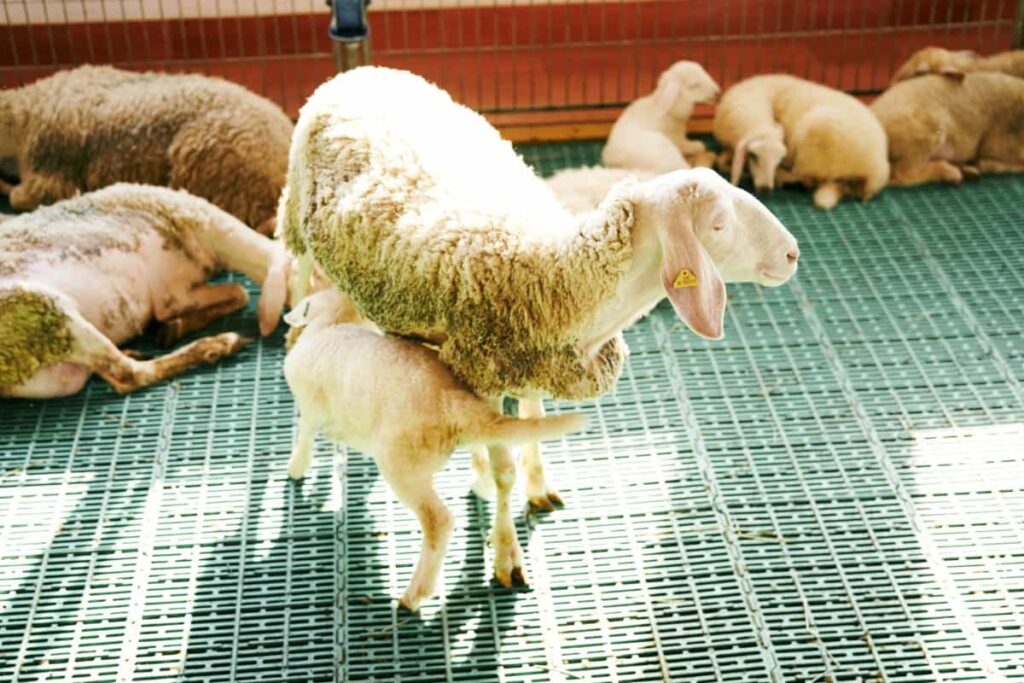
Sheep Farming Infrastructure in Karnataka
Successful sheep farming in Karnataka requires proper infrastructure, including secure fencing, well-ventilated shelters, reliable water supply, feed storage, and well-designed handling facilities. These facilities ensure adequate space for sheep, prevent predation and facilitate movement during routine tasks like shearing, vaccinations, and breeding.
Sheep Farming Insurance Options in Karnataka
Sheep farming in Karnataka requires insurance coverage to manage risks. Various options are available, including livestock, crop, and asset insurance. Livestock insurance protects against accidents, diseases, or natural calamities, while crop insurance covers losses from drought, flood, or other weather conditions. Asset insurance covers infrastructure and equipment used in sheep farming. Farmers should explore these options, consult with providers, and assess their needs to select the most appropriate coverage for their operations.
Conclusion
Sheep farming in Karnataka presents profitable opportunities, supported by the availability of loans and subsidies. With the right breed selection, proper infrastructure, and access to financial assistance, farmers can establish successful ventures and contribute to Karnataka’s thriving sheep farming industry.
- Profitable Village Farming Business Ideas in 2024
- High-Yield Aquaculture: Fast-Growing Fish for Farming
- Effective Fish Pond Construction Techniques for Beginners
- Irrigation and Water Management in Pineapple Farming
- Blossom to Harvest: Mastering Flowering and Pollination in Papaya Farming
- Pig Fattening Essentials: From Selection to Sale for Beginners
- Raising Wagyu Cattle: A Complete Guide for Premium Beef Production
- Soil Types and Their Water Holding Capacity
- Optimizing Irrigation Schedules for Coconut Groves for Enhanced Yield
- Espresso Your Garden: Coffee Grounds for Healthier Acid-Loving Plants
- The Best Soil Mix for Snake Plants: How to Mix Your Own Snake Plant Soil
- Green Thumb Success: Expert Tips for Cultivating Greenhouse Beans All Year Round
- Bloom All Year Round: The Ultimate Guide to Indoor Hyacinth Care
- Eco-Friendly Gardening: How to Make Liquid Fertilizer from Kitchen Waste
- Ultimate Guide to Grow Anise in Pots: Explore Seed Propagation to Harvesting
- Guide to Raising Chester White Pigs: Discover Breed Facts to Growth Management
- Mastering the Elegance: The Ultimate Guide to Weeping Cherry Tree Care, Planting, and Maintenance
- Ultimate Guide to Planting Garlic in Grow Bags: Growing Strategies for Beginners
- How to Fix Spider Plant Leaf-Related Problems: Natural and Organic Remedies
- 10 Reasons Why Your Tulsi Plant is Shedding Leaves: Home Remedies and Solutions
- Optimizing Growth and Yield: The Advantages of Palm Bunch Ash Fertilizer
- Utilizing Neem Oil Extract as a Natural Pesticide for Hydrangea
- From Soil to Harvest: Various Ways in Which Farmers Can Use AI Tools
- Steps to Encourage and Induce Citrus Flowers: A Comprehensive Guide
- How to Fix Snake Plant Leaf-Related Issues: Natural and Organic Remedies
- Transform Your Garden into a Fragrant Oasis with Raat Ki Rani (Night Blooming Jasmine)
- Discover the Ideal Chicken Breeds for Philippine Farms
- How to Create a Poultry Egg Farm Business Plan for Profits
- Grow Lemon Cucumbers Like a Pro: Insider Techniques for Bountiful Yields
- Ultimate Guide to Caring for Your Pink Princess Philodendron: Tips for Thriving Variegation
- Areca Nut Profit Per Acre: Calculating Yield and Cost of Cultivation
- How Kaveri Chicken is Becoming a More Profitable Breed in Indian Backyards
- Transform Your Barn: 9 Steps to Convert a Horse Stall into a Chicken Coop
- Exploring Suffolk Sheep Disadvantages with Limitations and Challenges
- Guide to Solving Potted Lemon Tree Problems: How to Revive Lemon Tree in Containers
- Steps to Encourage Female Pumpkin Flowers: Best Strategies for More Flowers and High Yields

Details about sheep farming subsidies